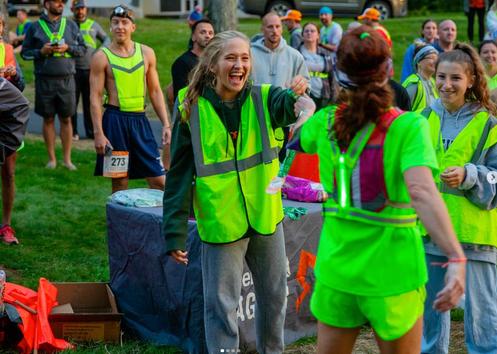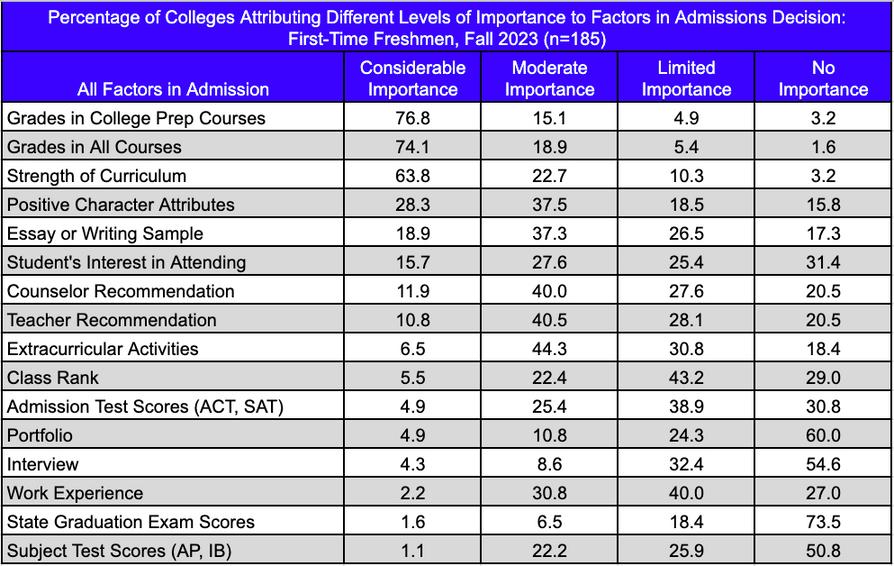
6 minute read
MYTHS, FACTS, AND NUANCE: What do Colleges Look For?
WHAT DO COLLEGES LOOK FOR?
ACADEMIC ACHIEVEMENT- COURSE SELECTION, GRADES GPA
Achievement in college preparatory courses is the most influential element in assessing a student Most state universities, and a sizable number of private colleges, will make initial admissions decisions strictly on the basis of your transcript and standardized test scores (if submitted).
When assessing your transcript, college admissions offices pay attention to the courses you have chosen to take, and whether you have taken a “full” course load during each year of high school. Though every student’s course selection is nuanced and tailored to the strengths and interests of each student, a most competitive course load typically consists of 5 academic units per year across the areas of English, history, math, science, and/or foreign language Your transcript will be closely examined from three vantage points: breadth (choosing courses from many disciplines), depth (advancement in subjects like language and math), and level of difficulty (honors and AP courses).
Admissions offices also hope to find consistency in your grades, as well as an upward trend in your GPA as you advance through your high school years In addition, what teachers say in recommendations about effort and accomplishments will also contribute to the college’s assessment of academic achievement.
Grades are communicated to colleges via your Holderness School transcript, sent directly to the college by the College Counseling Office Note that the transcript does not include standardized test scores, or a calculated GPA, but does indicate AP or honors courses. Once you have applied to a school, any new grades will be sent.
Every transcript we submit to a college is accompanied by the Holderness School Profile, which contains information about our grading policies and other pertinent academic information.

Standardized Test Scores
The COVID-19 pandemic has changed the landscape of standardized testing significantly in the last three admissions cycles. For the high school class of 2023, over 1800 accredited 4-year colleges and universities did NOT require this form of testing which is about 80% of bachelor degree granting schools However, some selective schools show 12% of accepted students submitting scores, while others show 91% of accepted students submitting scores Lastly, with only the top testers submitting each year, the median score at each school is rising each year.


Summary: It is worth your time to try and achieve a high test score, but know it no longer holds the weight it once did
For more information and a list of test-optional schools, visit www.fairtest.org.
MYTHS,
WHAT DO COLLEGES LOOK FOR?
Extracurricular Activities
Many admissions offices look to see what students have done in the Holderness community and in the community beyond Holderness (not just in Plymouth, but at home, on vacations, etc ) The activities you pursue outside the classroom – athletics, student publications, performing arts, leadership positions – demonstrate the kind of contributions you are likely to make to a college community. Colleges are interested in lifetime hobbies, long-term associations with civic organizations, and service opportunities They like to see a candidate who is deeply involved in and committed to a few activities, rather than someone who participates in many activities just to “pad the resume.”


Citizenship
Letters of recommendation from teachers and your college counselor provide a composite evaluation of character and personality Admissions offices glean inferences about motivation, organization, ambition, and integrity from both the academic record and the recommendations.
One of the strengths of many applicants from Holderness is that activities such as leadership and community service are integral parts of the Holderness experience How experiences at Holderness are applied to opportunities beyond school is an important indicator of character to an admissions office. Sometimes colleges find very little to distinguish between applicants on the basis of academic record and test scores In those cases, the deciding factor may come down to a special talent or the potential that the student will contribute and make a difference in the college community

SUMMERS/FREE TIME
Many students wonder about what they should do in the summer to best position themselves in the college process, we believe, and colleges agree, that authentic, purposeful activities are the answer. For some students, with specific and genuine interests, this may mean finding a pre-college program (with a financial cost). Working a full-time job in the summer, volunteering and/or helping family members, etc is quite valued by the college admissions process
If you are wondering about a program you can see a list of options here.
WHAT DO COLLEGES LOOK FOR?







The answer to this question varies widely; each institution has its own unique set of qualifications it is looking for, and its own way of arriving at a decision How schools evaluate applications can vary based on factors such as the size of the school, how selective it is, and the institution’s philosophy. Admissions goals can also vary over time, even from year to year, due to changes in administration (a new president or new admissions director, for example) or changes in admissions goals (was the school over- or under-enrolled last year?). Further, admissions goals can even vary within a particular school – state universities may evaluate in-state and out-of-state students based on different standards
Every year, the National Association of College Admissions Counselors (NACAC) conducts a survey asking colleges what factors they consider to be most important in influencing admissions decisions The results of a recent survey follow






